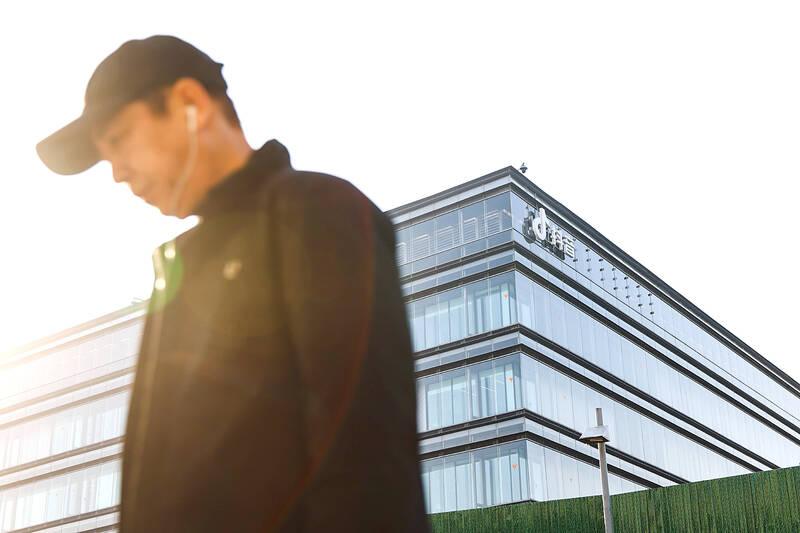TikTok’s expected shutdown today poses the biggest threat to the universe of small and medium-sized firms and so-called influencers who depend on the short-form video site for their livelihood, while big brands are expected to move to other sites.
TikTok said its US site generates billions for businesses selling candies, beauty products, clothes and other consumer goods, but that economy is under threat. The US Supreme Court on Friday unanimously upheld the law banning TikTok in the US on national security grounds ahead of a blackout this weekend.
After the ruling, US president-elect Donald Trump, who takes office tomorrow, said he would make a decision on TikTok, without providing details.

Photo: AFP
As a marketing tool for businesses, ByteDance Ltd’s (字節跳動) TikTok generates revenue for itself, and for many of its users and merchants, through sponsorships and by collecting fees on sales.
Many TikTok users are paid to be brand ambassadors for companies, selling merchandise and affiliate partnerships where users are paid commissions by companies when audiences purchase items linked on their social profiles. TikTok also compensates some creators for making videos.
Those who receive revenue from TikTok also include start-ups, consumer companies and bloggers cashing in on the platform’s massive reach of up to 170 million Americans.

Photo: EPA-EFE
For example, small and medium-sized food and beverage businesses, the revenue of which increased by US$4.1 billion in 2023 from marketing and advertising on the app, stand to lose the most, estimates by economic advisory firm Oxford Economics showed.
That data was commissioned by TikTok.
TikTok CEO Chew Shou Zi (周受資) said in a video posted to the app on Friday that 7 million US businesses earn a living on the platform.
For Mama V’s Candy, the e-commerce arm of Bytedance’s video platform, the TikTok Shop, changed the trajectory of the business, owner Valerie Verzwyvelt said.
“We have pretty much stayed viral since the beginning of the TikTok Shop launch last year,” Verzwyvelt said.
The company, which sells extremely sour candies, made US$6 million last year and has sold nearly 300,000 units on the app, she said.
“We are on our second expansion,” she said, a decision the Pineville, Louisiana-based company made before the reality of today’s deadline set in. “I have to rebuild my business now.”
Sven Greany, co-owner of California-based independent beauty brand Simply Mandys, said that a TikTok ban would bring his business to a “screeching halt” after a record holiday shopping season.
Simply Mandys made more than US$20 million in sales last year on the TikTok Shop with the help of livestreaming.
Greany said he never fretted about the app’s ties to China, adding that 95 percent of the company’s total sales come from shoppers on the platform.
However, the company has plans to shift its marketing to Meta Platforms Inc’s Instagram once TikTok is no longer available, but TikTok’s privacy policy blocks sellers from accessing shopper e-mails, addresses and other information that could be useful for marketing outside of the platform.
Essentially, if TikTok disappears, so do Simply Mandys’ customers, Greany said.
Other businesses are holding sales and dropping prices to clear out inventory in the event that traffic to their shops comes to an abrupt end today.
That is not stopping some influencers from recommending products as they look to cash out ahead of the ban.
“These TikTok shops are mass ‘clearancing’ their products in anticipation of the ban, so I’m linking some clearance products that I love for skincare,” one user told her 65,000 followers.
Beyond commissions, a TikTok influencer with 10,000 to 100,000 followers can potentially earn US$2,000 per brand campaign, Lithuania-based influencer marketing agency Billo said.
For some of TikTok’s top US creators, the entirety of their income would come to a halt, while the major companies they have partnered with pivot to other platforms, such as YouTube or Instagram.
Oxford Economics said that small and medium-business-activity on TikTok contributed US$24.2 billion, or a small sliver of overall US GDP in 2023, while supporting 224,000 jobs. Reuters could not independently verify those estimates.
Yuriy Boykiv, chief executive of e-commerce consultancy Front Row, said his clients made contingency plans to shift their marketing spending to other platforms that have similar short-form videos such as Instagram and YouTube.
“Every client has known about this possibility of TikTok going away since April of 2024, so everybody has done some preparation,” Boykiv said.
Front Row’s clients include Procter & Gamble Co’s haircare brand Ouai and LVMH Moet Hennessy Louis Vuitton SE’s Sephora, according to its Web site.
“We go where our community is and right now that includes TikTok. If they shift to other platforms in the future, we’ll be right there with them,” Kory Marchisotto, chief marketing officer at e.l.f. Beauty Inc, said in a statement.
Mitchell Halliday, the founder and creative director of British beauty brand Made By Mitchell, which launched on the TikTok Shop in the US at the end of August last year, started selling on the shop in the UK in 2022 and became the first British beauty brand to hit US$1 million in sales in one day on the platform.
“TikTok is the hub of beauty nowadays. It used to be YouTube, then it was Instagram, and now it is TikTok,” Halliday said.

Merida Industry Co (美利達) has seen signs of recovery in the US and European markets this year, as customers are gradually depleting their inventories, the bicycle maker told shareholders yesterday. Given robust growth in new orders at its Taiwanese factory, coupled with its subsidiaries’ improving performance, Merida said it remains confident about the bicycle market’s prospects and expects steady growth in its core business this year. CAUTION ON CHINA However, the company must handle the Chinese market with great caution, as sales of road bikes there have declined significantly, affecting its revenue and profitability, Merida said in a statement, adding that it would

MARKET LEADERSHIP: Investors are flocking to Nvidia, drawn by the company’s long-term fundamntals, dominant position in the AI sector, and pricing and margin power Two years after Nvidia Corp made history by becoming the first chipmaker to achieve a US$1 trillion market capitalization, an even more remarkable milestone is within its grasp: becoming the first company to reach US$4 trillion. After the emergence of China’s DeepSeek (深度求索) sent the stock plunging earlier this year and stoked concerns that outlays on artificial intelligence (AI) infrastructure were set to slow, Nvidia shares have rallied back to a record. The company’s biggest customers remain full steam ahead on spending, much of which is flowing to its computing systems. Microsoft Corp, Meta Platforms Inc, Amazon.com Inc and Alphabet Inc are

RISING: Strong exports, and life insurance companies’ efforts to manage currency risks indicates the NT dollar would eventually pass the 29 level, an expert said The New Taiwan dollar yesterday rallied to its strongest in three years amid inflows to the nation’s stock market and broad-based weakness in the US dollar. Exporter sales of the US currency and a repatriation of funds from local asset managers also played a role, said two traders, who asked not to be identified as they were not authorized to speak publicly. State-owned banks were seen buying the greenback yesterday, but only at a moderate scale, the traders said. The local currency gained 0.77 percent, outperforming almost all of its Asian peers, to close at NT$29.165 per US dollar in Taipei trading yesterday. The

The US overtaking China as Taiwan’s top export destination could boost industrial development and wage growth, given the US is a high-income economy, an economist said yesterday. However, Taiwan still needs to diversify its export markets due to the unpredictability of US President Donald Trump’s administration, said Chiou Jiunn-rong (邱俊榮), an economics professor at National Central University. Taiwan’s exports soared to a record US$51.74 billion last month, driven by strong demand for artificial intelligence (AI) products and continued orders, with information and communication technology (ICT) and audio/video products leading all sectors. The US reclaimed its position as Taiwan’s top export market, accounting for